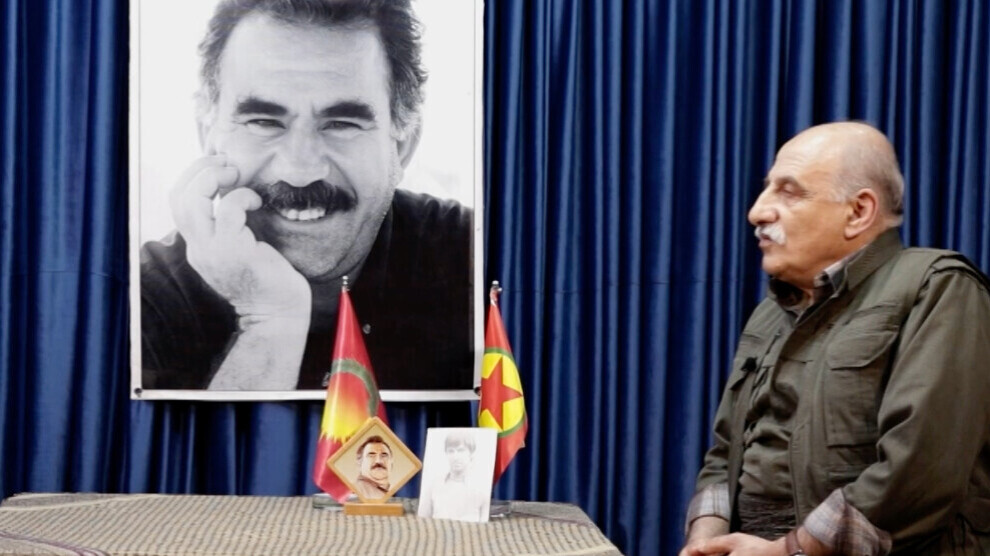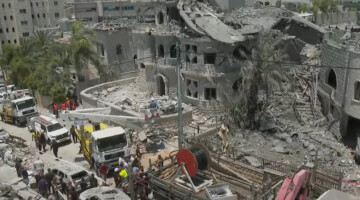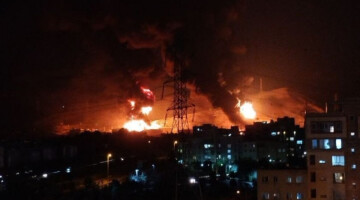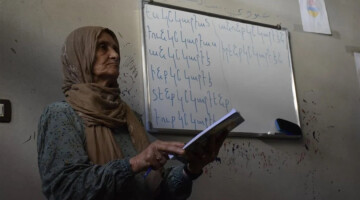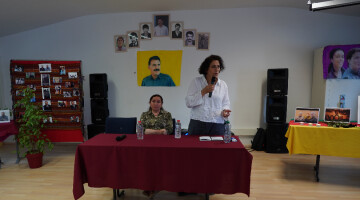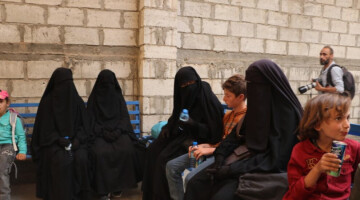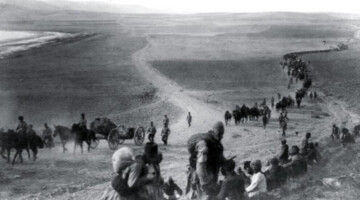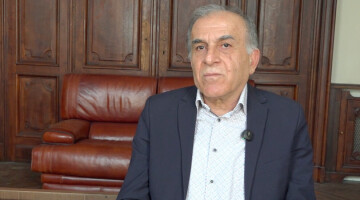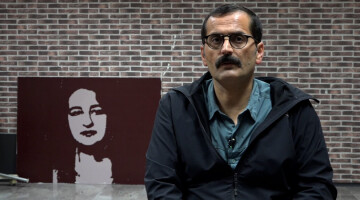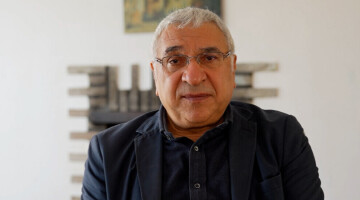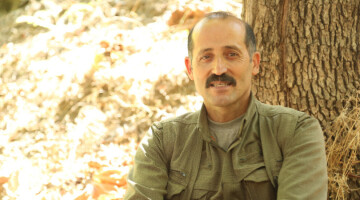In an interview with Medya Haber TV, Duran Kalkan, member of the KCK Executive Council, spoke about the latest developments in Kurdistan, the Middle East and the world, also with a new elaboration on the current situation on Imrali, a contextualization of the activities related to the 9th anniversary of the genocide of the Ezidis, the contemporary significance of August 15, 1984 and the breakthrough of the guerrilla struggle, as well as an assessment related to the recent targeted attacks of the Turkish state on nature and the recent youth conference.
We publish the first part of the in-depth interview below.
Initially, we would like to focus on Abdullah Öcalan and the situation on Imrali. Is there any news? How is Kurdish society dealing with the ongoing isolation? And what is Abdullah Öcalan’s role today in the context of the Kurdish Freedom Movement?
First, I would like to send my greetings to Rêber Apo [Abdullah Öcalan] whose resistance against the ongoing isolation continues. The system of Imrali is a system of isolation, torture and genocide. The situation there has not changed, and we should not expect any changes there anytime soon. That is because of the current administrators of this system. They are spreading lies through public statements. For example, the [Turkish] Minister of Justice and the [Turkish] President both stated that there was no violation of law, which is simply untrue. They are not even following their own laws. The sole intention of them constantly talking about ‘disciplinary punishments’ being imposed is merely to prevent meetings with Rêber Apo from taking place. They are trying everything to prevent Rêber Apo from being granted his physical freedom, which he has been denied for 25 years now. His situation, therefore, must be re-evaluated based on the application of European law. This is what they want to prevent with these so-called disciplinary punishments. They claim that all their methods are legal, while they constitute clear violations of the law.
The other forces who bear responsibility for Rêber Apo’s situation remain silent as well. They pretend to be blind and deaf. The CPT [European Committee for the Prevention of Torture], the Council of Europe and other institutions remain silent. This silence indicates an agreement. It reveals that these institutions support the practices of AKP-MHP fascism on Imrali.
At the same time, we can also see that the struggle for Rêber Apo’s physical freedom, against the isolation on Imrali and against the system of torture and genocide is growing stronger on many different levels. Recently, there have been important activities in this framework, especially abroad. For example, there was the press conference on July 26 in Brussels. This was a call to action in the framework of the demand for the physical freedom of Rêber Apo, which was organized jointly by trade unions, intellectuals and communities. There was also a conference on this issue in Colombia. And there were two protests by the Kurdish youth together with their internationalist friends in Europe. A concert for Rêber Apo also took place in Italy recently. In addition, there were also statements made by Italian and Scottish unions.
In short, all over the world there are calls and efforts for the physical freedom of Rêber Apo. We have said before that humanity wants to hear the voice of Rêber Apo. All these activities clearly show that humanity, the democratic forces, intellectuals, politicians, even philosophers, women and young people all over the world need the ideas of Rêber Apo. Because his ideas offer a clear solution to all current problems, especially the solution to the Kurdish question. The line of the Democratic Nation, as well as the system of Democratic Confederalism, were developed on the basis of the idea of democratic self-administration. They are ways of finding solutions to all the problems created by the system of power and state, especially the nation-state of capitalist modernity. This is a paradigm for solving all social problems, as well as for organizing society.
In Kurdistan itself, protests for the freedom of Rêber Apo continue. Our people in Rojava [Western Kurdistan/Northern Syria] have been continuously rising up against the situation and are very sensitive regarding this topic. From time to time, they organize big mass protests. There are also various events being organized in North Kurdistan [South-Eastern Turkey] and South Kurdistan [Northern Iraq]. In Eastern Kurdistan [Western Iran], our people demonstrated a lot in the past, but now this has decreased a bit due to the pressure. But it is not unknown what the attitude of the absolute majority of the Kurdish people is there.
We can therefore see that there is a clear united stance. There is a unity of the Kurds, women, youth, intellectuals and artists and politicians in the four parts of Kurdistan and abroad. They reject the system of torture, isolation and genocide on Imrali. They want the physical freedom of Rêber Apo. On this basis, they demand the solution to the Kurdish question, the recognition of the freedom and the democratic rights of the Kurds, a democratic Middle East, a free humanity, the strengthening of the women’s liberation revolution in all fields and the spread of a free life everywhere on the basis of women’s freedom.
Everything is related to the Kurdish question. The First World War led to this situation. The agreements made after the First World War – the Armistice of Mudros and the Treaty of Sevrès – could not be implemented, which in the end resulted in the Treaty of Lausanne. In 1926, the UK drew the Turkish-Iraqi border based on the Ankara Agreement. The current Turkish Republic was founded on the basis of the Kurdish genocide and of hostility towards the Kurds. This prevents the democratization of the Middle East and threatens humanity with fascist terror. We will continue to keep this issue on the agenda. Had it not been for the establishment of such a republic or the Treaty of Lausanne, perhaps there would have been no Hitler, no Mussolini, there would have been no Second World War in Europe, and humanity would not have suffered such massacres. In other words, everything has come to be related to the Kurdish question. And the Kurdish question itself is of course related to the genocidal regime in Imrali. Because the will of the Kurdish people is in Imrali. Rêber Apo is the leader. He is the solution power to the Kurdish question.
For 29 months we have not received any new information about Rêber Apo. We consider it as our duty to continue shouting out the truth and to improve our analysis. We have to strengthen and spread the struggle. There is no withdrawing from this. The youth in Europe said that they will not stop, not sit and not sleep until the physical freedom of Rêber Apo is ensured. This is the right attitude. On behalf of our party, I call on all our people, women, youth, international friends and everyone else to participate more in this sacred and fundamental struggle for democracy, and to strengthen it with the help of new creative methods.
A few days ago was the anniversary of the genocide of the Yazidis carried out by IS, on the occasion of which various activities took place. What has changed over the last years and where does the self-administration of the Yazidis in Shengal [Sinjar] stand today?
For 9 years, the Kurdish-Yazidi people in Shengal have experienced very serious changes with regards to freedom and democracy. In the beginning, they stood against the genocidal attack of the Islamic State [IS]. These gangs were defeated with the support of the guerrillas of the HPG [People’s Defense Forces], and the fighters of the YPG and YPJ. After that, great political awareness, especially among the women and youth in Shengal, a resistant attitude and organization developed among the people. I would like to respectfully salute this resistance and remember all the heroic martyrs of this holy struggle, especially in the person of comrade Mam Zeki. They are true martyrs of freedom, democracy, humanity and solidarity.
On the 9th anniversary of this genocidal attack and the resistance against it, important events took place. The Kurdish-Yazidi people took a clear stance with their statements, marches, and demonstrations. Their institutions and democratic organizations also took an important and meaningful stance and stated that they will continue this struggle for liberation and democratization until the end.
Recently, there was also a conference in Baghdad which was attended not only by Kurdish-Yazidis, but also by other communities, including those who are considered minorities in Iraq. This important conference produced major results and important demands were made. Those who attended the conference expressed their desire for democratization based on self-administration and the full implementation of the Iraqi constitution. Iraq applies its constitution only in some places and not in others. This creates problems. We therefore think that the Iraqi administration will reconsider this situation.
During the conference, a clear stance against betrayal was also taken, including the demand to put the KDP on trial. Indeed, it is important that all those be put on trial who ran away from IS and thus left the Kurdish-Yazidi people to genocide. Without putting them on trial, the crime of genocide cannot be effectively condemned or brought to an end. Why did the [forces of the] KDP run away back then? They had made a deal with IS, that is why. We have stated before that there are reports about a meeting in April or May 2014 in the capital of a country neighboring Syria. Apparently, in this meeting the decision for the IS attacks was taken. At the time, there was a rumor saying that Mesut Barzani had also been present at this meeting. In fact, this is not a rumor, it is certain. How did this affect us? At the time, we were holding a conference in Northern Kurdistan in mid-May. During the conference, we received information about this meeting from our foreign relations committee. We were informed about a new force that had emerged and that this force was going to attack to divide Iraq and Syria. The IS then attacked Mosul on June 12. In August, it attacked Shengal and Maxmur. Then it headed towards Kirkuk and Rojava. This was an attack on the Kurds. In fact, there was an agreement between IS and the KDP made during the afore-mentioned meeting. The KDP had agreed to give some places to IS but later changed their decision. They said that IS attacked in order to put pressure on them. But it can easily be seen that the KDP never fought anywhere against IS and only pretended to fight in some places in order to deceive the people and to get some support.
Kurds supported and basically led the struggle against IS. Those who wanted to support the Kurds in this struggle regarded the KDP as the Kurdish administration. This was exactly the main goal of the KDP. They only pretended to be the opponent of IS. In this context, it is important that the demand of the latest conference to put the KDP on trial comes from the community of Shengal itself.
The KJK [Kurdistan Women’s Communities] recently also announced a campaign from August 3 until 15. It is carried out with the aim of supporting and helping the women of Shengal and Afghanistan against the attacks of dominant men. This also led to a mobilization within Shengal and further encouraged women to continue being the vanguard of this change. In this context, a forum took place in Raqqa. In fact, Afghanistan, Shengal and Raqqa are extreme points where patriarchal attacks on women have taken place. Of course, they are not limited only to these places, you find them everywhere, but the attacks in these places are more cruel, sometimes more subtle and disguised. There is a women’s liberation struggle against them in every field. It is the ideology of women’s liberation, this struggle and revolution that represents liberation against all kinds of oppression and exploitation of the 5,000-year-old hegemonic and state system and that reveals the foundations of a free life. Rêber Apo has subjected this to a very broad evaluation and analysis. The main factor in the developments in Kurdistan, the struggle for the solution to the Kurdish question and its inexorability, is the women’s liberation struggle and the creation of women’s leadership in the struggle at all levels.
Some states recognized the attack of IS on Shengal as genocide. Lately, the British state has done so on the anniversary. Actually, we need to look at the practices of those forces which recognize this as a genocide. The Yazidis were massacred by IS and since they have been defeated, the AKP-MHP and KDP are carrying out these attacks without a break. Now, if the attacks of IS have been labeled as genocide, what are the attacks of the AKP-MHP and KDP? Aren’t these also genocide? On the other hand, do those who call it genocide support the development of the democratic self-administration of the people of Shengal, the provision of autonomy, and the formation of a self-defense system? Saying that they recognize the genocide without providing these does not mean anything, but a deception. I think our Yazidi society should be sensitive, especially when it is about Germany. They are constantly trying to have the Yazidis migrate from Kurdistan to Europe. Instead of strengthening the consciousness, organization and self-management of Yazidi society, they are trying to scatter the community even more, to scatter it all over the world and make it cease to be a community. Our Kurdish-Yazidi people must be sensitive to these policies and should develop their own consciousness and organization more and rely on their own power. They should also choose their allies correctly. It must trust in the free democratic life of the peoples and develop alliances with them. Its own strength and alliance with the peoples is in fact the fundamental attitude that will protect and save the Kurdish-Yazidi people from further genocide. For this reason, education, organization and awareness-raising are absolutely necessary to become an organized society with self-defense. In this sense, I would like to wish a lot of success to our Kurdish-Yazidi people.

